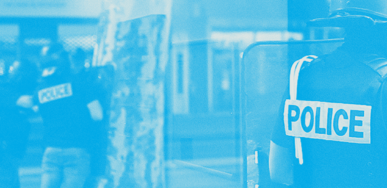
[00:00:00] Martien Halvorson-Taylor I'm Martien Halvorson-Taylor
[00:00:01] Kurtis Schaeffer and I'm Kurtis Schaeffer.
[00:00:04] Martien Halvorson-Taylor And this is Sacred & Profane, a show about how religions shape us and how we shape religions. Tonight will mark the 13th night of protests around the country. They began in Minneapolis after George Floyd was murdered by a Minneapolis police officer as three other officers looked on. His death was both shocking and ordinary. One more name in a list of black and brown men and women and children killed by police in this country as a result of the violence that people of color have faced for over 400 years.
[00:00:49] Kurtis Schaeffer In academia, we can lapse into talking about systemic racism and white privilege abstractly, many of us study the larger patterns of racism and injustice. Universities condemn police killings and reaffirm commitments to equality on paper. But there's not often concrete steps that lead to tangible change. In other words, a lot of talk, but not a lot of walk. And that's what struck our colleague, Larycia Hawkins, when she was teaching politics at an evangelical Christian college outside Chicago.
[00:01:24] Larycia Hawkins I remember being on the Green Line in Chicago one afternoon, it was April.
[00:01:34] Everyone's hopeful in Chicago that it's going to stay warm. It never does. And I see a woman. She's on her laptop. I'm thinking, well, that's unwise because there had been a rash of robberies of iPhones and other kinds of things. And so I was judging her internally.
[00:01:54] And she is working away on her laptop.
[00:01:57] And a young man, a young black man is standing next to her and she looks up. She said, How you doing? And he said, I'm good. And she said, Where's your jacket? And he said, I don't have one.
[00:02:14] And she immediately puts her laptop down. Takes off her jacket.
[00:02:23] And gives it to him as he's about to get off. She says, you stay safe out there.
[00:02:31] And I see this. And.
[00:02:35] It takes everything within me not to cry because I'm thinking what I'm literally thinking is. I just saw Jesus on the Green Line.
[00:02:56] In the Sermon on the Mount, what Jesus says is if your neighbor asks for your cloak, give him your coat. And it's a very small act, but it's the most significant act to take the clothing off of your body and give it to a stranger to care for the most uncared for, the most feared body in all of Chicago. And in all of this country: a young black man. And that's it. That's embodied solidarity and it's as insignificant as that. And like I said, that is the most significant thing we can do. That's all embodied solidarity is. But it requires the seeing. She saw him.
[00:03:44] She saw. A human worthy of respect and dignity. The least respected and dignified human in this country. A young black male. He's probably 18, 17, and every other person on the train was probably afraid of him.
[00:04:10] I was always thinking about how disconnected in the academy we are from our bodies. And I'm trying to get away from emphasizing only the mind.
[00:04:21] And as a Christian, there's an overemphasis in many Christian denominations, whether fundamentalist or evangelical or even Catholic, on the spiritual to the detriment of the physical, again, to the detriment of em body meant, even though we believe that Jesus embodied the highest form of solidarity, which is death on the cross.
[00:04:45] I was thinking about how do I bridge theory and practice and as a political scientist, my task is to teach students about the role of government in the world. The role of politics and the overarching purpose of government is to do justice in the public realm.
[00:05:08] Since George Floyd died, two both attended and witnessed the protests.
[00:05:17] I feel quite torn. I'm on the one hand quite grateful for the ways that bodies pour into the street in what I believe is a form of embodied solidarity.
[00:05:34] Absolutely.
[00:05:36] I think protest is one form. But I'll also say that embodies solidarity is costly and it's less costly for certain kinds of people to show up and march than others.
[00:06:04] Protest is also sexy. It's something that people can do to assuage their guilt, to absolve themselves of history's painful, continual porking of the body of black, indigenous and other people of color.
[00:06:28] And so I'm.
[00:06:33] Grateful.
[00:06:34] And I'm also dubious. I think distrust is a Democratic value. We talk about social capital and trust and reciprocity being core to social capital. I don't trust white people to do it.
[00:06:51] I don't. I wish I did and I wish I could.
[00:06:59] When I say that for some folk in the streets, this is not costly, what I mean is it's low hanging fruit.
[00:07:07] It's low hanging fruit for people who don't work three shifts on four jobs a week.
[00:07:16] Voting is low hanging fruit for my college students who will graduate and already have jobs lined up. The price of embodied solidarity is higher for them, and that's what I teach them.
[00:07:29] The scripture that I grew up learning says that we will know the righteous by their fruit, the righteous of whatever religion or non religion or ilk.
[00:07:43] I take that to mean that humans have within them the swell of humanity and we can suppress it.
[00:07:56] What Christianity has bequeathed to me, or I should say, being a Jesus follower, is also a sense of hope that that life and death are always commingled, that we're united in life and suffering and death. Which I also know is very Buddhist. That there's also a beauty in that unity. What I think embodied solidarity provides us is a prism. It's a prism. We have to have that perspective.
[00:08:31] May this death turn us towards life and being in embodied solidarity with the breath of our neighbors.
Monday marks the thirteenth day of nationwide protests after the murder of George Floyd by Minneapolis police officer Derek Chauvin. His death was both shocking, and ordinary. His is one more name in a list of black and brown men—and women, and children—killed by police in this country. Now, across the country, protestors are putting their bodies at risk from police violence, and from the COVID pandemic, with the hope of creating radical change. We spoke with our colleague Larycia Hawkins about the power—and the price—of embodied solidarity.
How to cite this episode:
Halvorson-Taylor, M., Schaeffer K. (Presenters), Hawkins, L. (Guest), & Gadek, E. (Producer), “The Breath of Our Neighbor.” Sacred & Profane (2020, June 8).
Additional Reading
Graham, Ruth. The Professor Wore a Hijab in Solidarity – Then Lost Her Job. 13 Oct. 2016, www.nytimes.com/2016/10/16/magazine/the-professor-wore-a-hijab-in-solidarity-then-lost-her-job.html.
Lebron, Christopher J. The Making of Black Lives Matter: A Brief History of an Idea. Oxford University Press, 2019.
Ore, Ersula J. Lynching: Violence, Rhetoric, and American Identity. University Press of Mississippi, 2019.
Shin, Sun Yung, editor. A Good Time for the Truth: Race in Minnesota. Minnesota Historical Society Press, 2016.
Stevenson, Bryan. Why American Prisons Owe Their Cruelty to Slavery. 14 Aug. 2019, www.nytimes.com/interactive/2019/08/14/magazine/prison-industrial-complex-slavery-racism.html.
TEDxTalks. “The Gospel and the Meaning of Embodied Solidarity | Larycia Hawkins | TEDxWilmingtonSalon.” YouTube, 29 June. 2016, https://www.youtube.com/watch?v=qn3lsZhWGy8.
Additional Credits
(Top banner)
“A southbound Green Line train nears 43rd St. Station, Chicago. December 20, 2018.” by: Pi.1415926535 is licensed under CC BY-SA 3.0.







